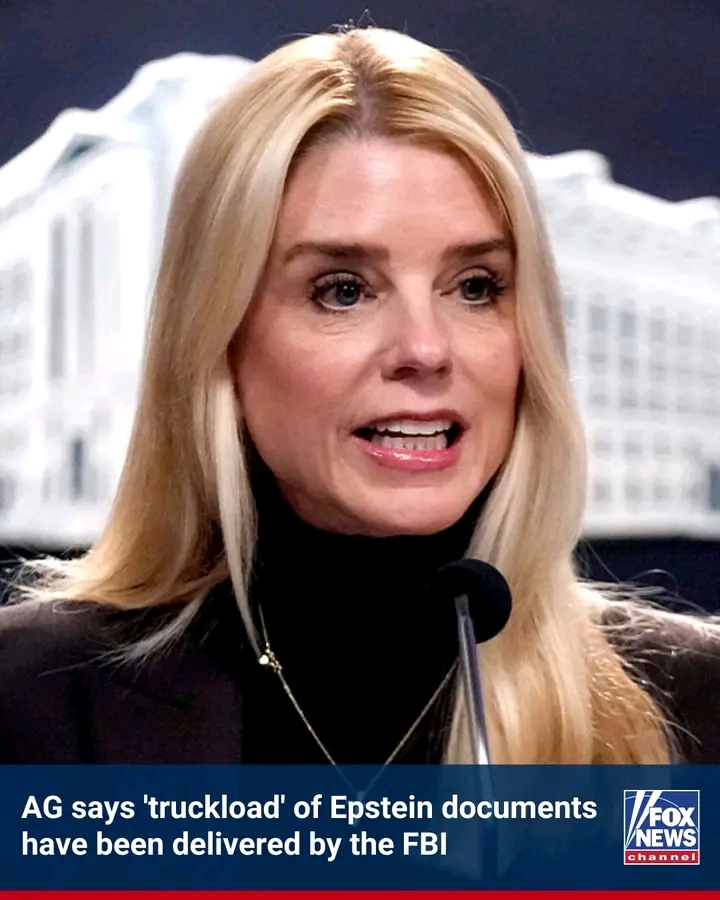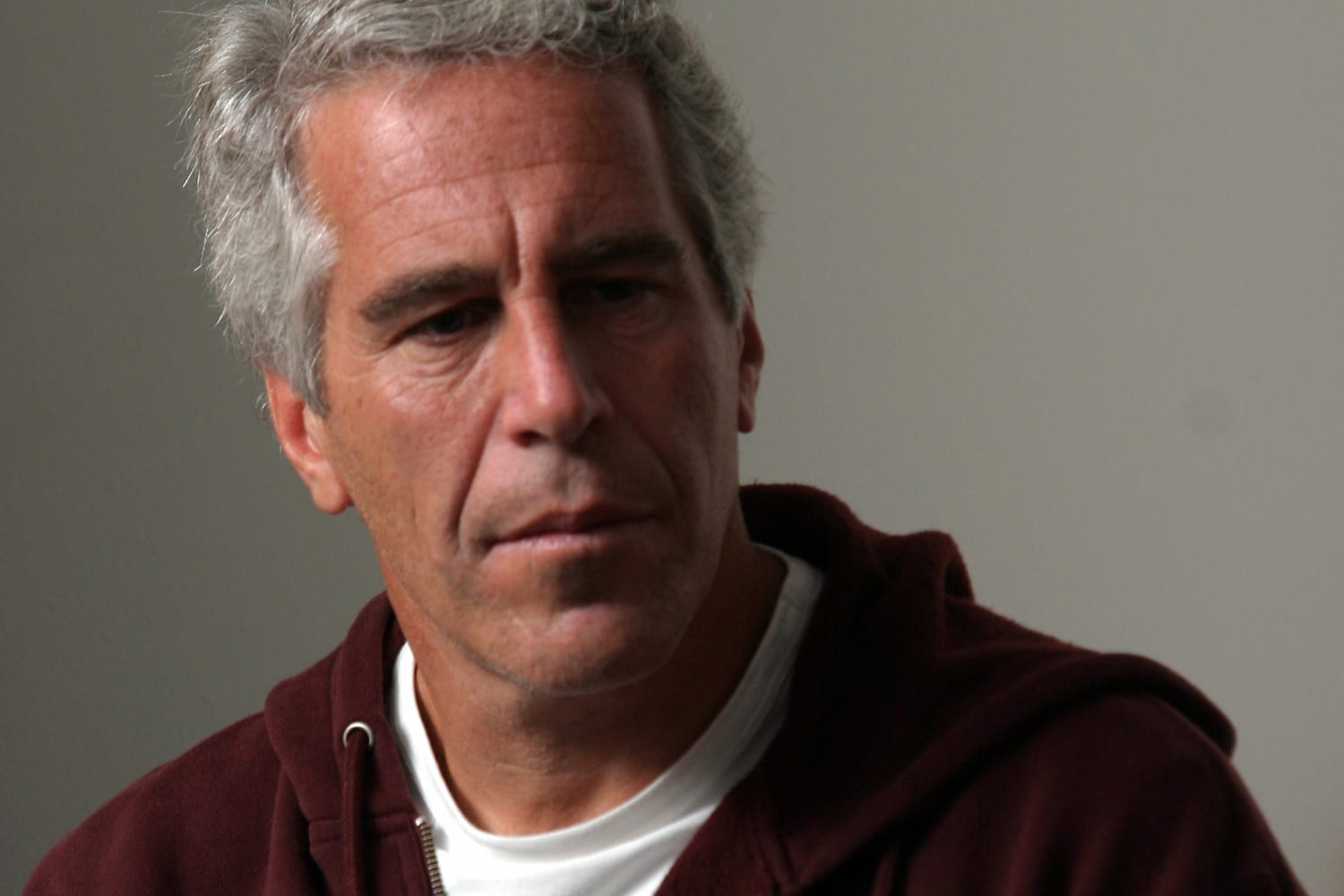‘YOU WILL KNOW’: Pam Bondi says “Americans have a right to know” what really happened with Jeffrey Epstein — and she’s standing by her promise to make it happen.

The latest move from the Trump administration’s push to release the docs and who’s being held accountable for the delay.
Speaking to Fox News host Sean Hannity on Tuesday night, Bondi confirmed that a “truckload” of Epstein files were delivered by the FBI after she gave the agency until 8 a.m. on Friday morning to deliver them.
“I gave [the FBI] a deadline of Friday at 8 a.m. to get us everything,” Bondi explained. “And a source had told me where the documents were being kept, Southern District of New York, shock. So we got them all by Friday at 8 a.m.”
“Thousands of pages of documents. I have the FBI going through them…and Director Patel is going to get us a detailed report as to why the FBI withheld all of those documents,” she continued.
Pam Bondi’s recent declaration has stirred renewed debate over transparency related to the Jeffrey Epstein case. In an appearance on Fox News with Sean Hannity, Bondi stated emphatically, “Americans have a right to know” what truly transpired regarding Epstein.
This announcement came on the heels of a dramatic development: the delivery of a “truckload” of previously withheld documents from the FBI. According to Bondi, after setting an 8 a.m.
Friday deadline, the files were turned over from a source within the FBI, located at the Southern District of New York, marking a potential turning point in public access to critical information about one of the most controversial criminal cases in recent history.
Bondi’s insistence on accountability and transparency comes at a time when the legacy of Jeffrey Epstein’s connections to powerful individuals continues to fuel public mistrust. For years, obscured details of the case have led to rampant speculation and frustration over the slow pace of disclosures.
The documents, reportedly comprising thousands of pages, are expected to shed light on a multitude of unresolved questions: the extent of Epstein’s network, details of any possible criminal conduct by associates, and the reasons behind the apparent shortfall in cooperation from various branches of the government when it came to releasing these records.
As the Trump administration pushes for more openness in this matter, Bondi is positioning herself as a champion for the public’s right to know, emphasizing that no stone should be left unturned.
The political backdrop of the administration’s push complicates the narrative further. By pressing the FBI for full disclosure, Bondi and her allies are not only advocating for transparency but are also challenging established protocols and practices within federal agencies.
Her confidence in the process—evidenced by her decision to set a clear deadline—suggests a belief that the pressure exerted by political figures can lead to tangible outcomes, even against the backdrop of bureaucratic resistance.

Bondi’s remarks have resonated with a significant segment of the public that has long been critical of the opacity with which sensitive investigations are conducted and managed.
This development has reinvigorated debates about the balance between national security interests and the democratic accountability of law enforcement agencies.
The delivery of these documents has been described by Bondi as a substantial achievement. With a “truckload” of pages now in hand, the FBI is reportedly working diligently to sort through the mass of data.
According to Bondi, Director Patel is expected to provide a detailed report explaining why these documents were withheld until now.
This forthcoming report is anticipated to serve as a critical piece of accountability, potentially holding senior officials or influential entities responsible for delays or lapses in ensuring timely disclosure.
Observers note that should significant discrepancies or deliberate withholding come to light, it could lead to calls for further investigations and possible reforms in handling classified or sensitive information.
The Epstein case has always been politically charged, involving not just accusations of heinous crimes but also deep questions about power, influence, and the reach of high-level networks.
Epstein’s connections to affluent and influential circles mean that any revelation pertaining to his case has implications far beyond the realm of criminal justice.
Bondi’s bold claims signal that there may be more to uncover, possibly implicating figures who have long been insulated from complete public scrutiny.
This dynamic is at the heart of the debate surrounding this latest release of documents. Supporters argue that full disclosure is essential for justice and restoring public trust, while critics contend that there could be risks associated with releasing too much sensitive information into the public domain.
In the unfolding drama, the role of the FBI has been brought under renewed scrutiny. Historically, federal agencies have been accused of withholding information to prevent compromising ongoing investigations or to protect the reputations of key individuals.

Bondi’s revelation about the location and retrieval of these documents signals that there may have been internal missteps or bureaucratic inertia that contributed to the prolonged secrecy.
The fact that such a large volume of documents exists and was gathered in one location suggests that there might have been systematic efforts to manage or even control the flow of information.
Bondi’s insistence that “Americans have a right to know” underscores a broader critique of any such practices, calling for reforms to ensure that the public interest is prioritized over institutional self-preservation.
As the story continues to develop, legal analysts are weighing in on the potential ramifications of the release of these documents.
The Epstein files have long been regarded as a treasure trove of evidence not only about Epstein himself but also about the intricate networks that enabled his activities for so long.
Some experts believe that the breadth of this archived material could lead to renewed legal actions and even spur fresh investigations into associated figures who might have been complicit.
The timing of the document release, coupled with Bondi’s announcement, has the potential to reignite debates in both the media and political arenas, particularly about accountability for public figures and the integrity of federal institutions.
Moreover, the controversy surrounding Epstein’s case has often been used as a litmus test for government accountability and transparency.
There is a deep-seated public demand for a full accounting of how the case was handled from the outset, particularly given the international dimensions and the high-profile nature of the individuals involved.
Bondi’s statement and the subsequent actions by the FBI and Director Patel represent an effort to answer these longstanding questions.
By holding the FBI to a strict deadline, Bondi has effectively re-energized calls for sweeping reforms and heightened oversight of how sensitive information is managed at the federal level.
With the promise of a detailed report on the delay, many hope that this incident might serve as a catalyst for improvements in transparency protocols across all federal agencies.
The implications of this development extend well into the realm of public discourse and political accountability. For many in the public, the Epstein case stands as a stark reminder that the truth is sometimes obscured by layers of bureaucracy and influence.

The documents in question are not just pieces of paper; they represent the possibility of uncovering truths that have been hidden for too long. In an era marked by growing skepticism towards government institutions, Bondi’s declaration challenges both the authorities and the system itself to live up to the democratic promise of truth and accountability.
Should the upcoming report reveal systemic failings or deliberate obfuscations, it could set off a chain reaction of political repercussions and legal consequences that impact not only the administration in power at the time but also the governance standards for future administrations.
As the nation awaits a more detailed explanation from the FBI, questions are mounting about the broader context in which these documents were managed.
Critical analysis by both proponents of open government and defenders of national security measures will likely continue to dissect the sequence of events that led to this release.
Observers suggest that regardless of the findings, the episode underscores the urgent need for reforms in how governmental bodies handle sensitive material. There is an increasing clamor for ensuring that essential records are accessible to the public without unnecessary delays or obfuscation.
Bondi’s actions, she insists, are a step toward rectifying past shortcomings and establishing a new standard where transparency is no longer negotiable.
In conclusion, the recent disclosure of a vast cache of Epstein-related documents represents far more than a mere procedural development in a long-standing investigation.
It symbolizes a broader struggle for accountability that touches upon every aspect of governance, national security, and public trust.
Pam Bondi’s determined stance, encapsulated in her resolute affirmation that “Americans have a right to know,” is fueling renewed momentum for transparency and reform at the highest echelons of government.
As the FBI continues its review and Director Patel prepares to outline the reasons behind the delay, all eyes remain fixed on the unfolding implications.
The release of these documents, in effect, may herald the beginning of a new chapter in ensuring that the mechanisms of power can no longer operate in the shadows, thus reaffirming the fundamental democratic principle that the public’s right to truth must always come first.
News
BREAKING: Lily Collins’ EMOTIONAL 36th Birthday—‘First as a Mama!’ Shares RARE Photos of Baby Tove & Husband Charlie!
Lily Collins celebrated her ‘first birthday as a mama’ as she turned 36 on Tuesday – and shared sweet family snaps…
BREAKING: White Lotus Star Alexandra Daddario TURNS HEADS at Australian Grand Prix—VIP Photos LEAKED
Alexandra Daddario flaunted her luxurious life at the Formula One Grand Prix in Melbourne. The White Lotus star, 39, was pictured on the grid…
I’m Convinced Alexandra Daddario Is The Perfect Casting Choice To Play Wonder Woman In James Gunn’s DCU
Alexandra Daddario has all the needed elements to bring Wonder Woman to life in the new DC Universe and make her performance as memorable…
Zoe Saldaña Says Oscars Rejecting ‘Avatar’ Acting Is ‘Quite Deflating’: ‘You’re Overlooked and Then Minimized and Completely Disregarded’
Zoe Saldaña, the acclaimed actress known for her roles in blockbuster franchises like Avatar and Guardians of the Galaxy, has never been one…
BREAKING: Zoe Saldaña’s FORGOTTEN Ballet Movie DESTROYS Her Oscar Role—Fans SCREAM ‘This Is Her REAL Masterpiece!’
Emilia Pérez is not the first time Zoe Saldaña has danced on screen, and her ballet performance in Center Stage showcased her musical…
BREAKING: Pixar’s NEW Movie Trailer LEAKED—Starring Oscar-Winning SUPERSTAR! Fans SCREAM ‘BEST ANIMATION EVER!’
After winning the Oscar for Best Supporting Actress for her performance in Emilia Pérez, Zoe Saldaña’s next movie will be the Pixar sci-fi movie Elio….
End of content
No more pages to load












